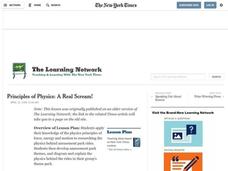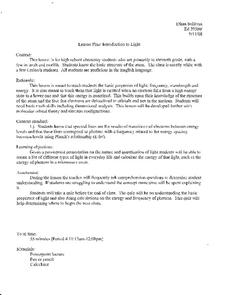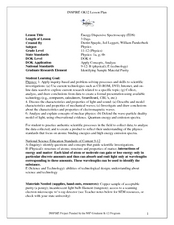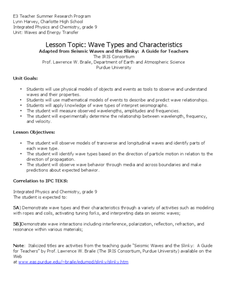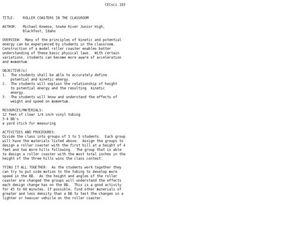Curated OER
Energy: The U.S. In Crisis?
High schoolers research and assess past, present, and future decisions related to energy shortages. They evaluate economic, political, and social impacts that led California to its near critical energy situation.
Curated OER
Principles of Physics: A Real Scream!
Students apply their knowledge of the physics principles of force, energy and motion to researching the physics behind amusement park rides.
Curated OER
The Warmth of the Sun
Pupils broaden their understanding of the sun, particularly its critical role in warming the land, air and water around us.
Curated OER
Power House
Students reflect, speculate, identify, research, and create a blueprint for renewable energy sources.
Curated OER
E3 Project Instrustional Plan
Students will learn about energy. This physics lesson plan, outlines the energy unit to be taught that covers energy, conversions, and heat.
Curated OER
Energy: Classroom Energy Hunt
Sixth graders list the different forms of energy. In this physics activity, 6th graders identify what form of energy a certain object possess. They explain the law of conservation of energy.
Curated OER
Units in Thermochemical Calculations
Students study how to complete thermochemical equations. In this equation lesson students learn how to manipulate equations to calculate energy changes and reactions.
Curated OER
Energy: The Big Picture
Students research about energy related topics. In this earth science lesson, students discuss ways to save energy. They create a presentation about their research and share it with the class.
Curated OER
Alternative Energy
Students identify the five major alternative energy sources. In this physical science instructional activity, students assess the advantages and disadvantages for each type of energy. They complete a concept map using information they...
Curated OER
Mississippi’s Electricity: From Generation to Consumption
Eighth graders discover how electricity is produced. In this physics lesson, 8th graders infer about the future of Mississippi's energy industry. They participate in a Smart Board interactive activity at the end of the lesson.
Curated OER
Powering a Green Earth
Students compare and contrast renewable and nonrenewable energy. In this environmental science instructional activity, students discuss the importance of going green. They identify the different components in a power grid system.
Curated OER
Introduction to Light
Learners study the basic structure of the atom. In this chemistry instructional activity, students explain how colors relate to energy that electrons emit. They calculate energy of the emitted photons.
Curated OER
Energy Dispersive Spectroscopy
Students calculate the values of electron binding energies. In this physics instructional activity, students solve for different wavelength characteristics of X-rays. They present their findings to the class.
Curated OER
Wave Types and Characteristics
Ninth graders identify the different parts of a wave. In this physics lesson, 9th graders observe wave behavior as it travels through a boundary. They determine the relationship between wavelength, frequency and velocity.
Curated OER
Free Shot Physics
Students discuss ways to test the bounciness of different balls. In this physics lesson plan, students measure how high each one bounce. They record data and compare results.
Curated OER
Electrical Energy
Young scholars compare and contrast a cell and a battery. In this physical science lesson, students explain how they create energy. They conduct an experiment to apply what they have learned in this lesson.
Curated OER
Observing Motion
First graders explore movement and motion. In this motion lesson, 1st graders how objects can move as well as how the Earth is in constant motion and the force of gravity. Students complete a coloring sheet.
Curated OER
Heat from Light
Second graders explore solar energy. In this science lesson, 2nd graders use hand lenses to see that light energy can be converted to heat energy.
Curated OER
Craters!
Eighth graders examine the formation of craters. In this craters lesson, 8th graders discover the various energies involved in the formation of a crater, where you can find a crater in the Solar System, and observations of craters on the...
Curated OER
Energy Efficient Homes
Students evaluate their home to see how energy-efficient it is. In this energy efficiency lesson students complete a worksheet and search the Internet to find ways of making their home more energy-efficient.
Curated OER
Solar
Learners study solar energy. For this renewable energy lesson students complete several lab activities using different controls and variables.
Curated OER
"I, Robot"
Seventh graders define vocabulary and discuss the characters in a movie. In this solar station lesson plan students explore robots on the Internet.
Curated OER
Thermal Energy Transfer - Conduction
Young scholars examine how heat passes through a pane glass window. In this energy transfer lesson students complete a lab activity.
Curated OER
ROLLER COASTERS IN THE CLASSROOM
Students define potential and kinetic energy and explain the relationship of height to potential energy. In this roller coaster lesson students construct a model of a roller coaster which will allow them to see the basic physical laws.



